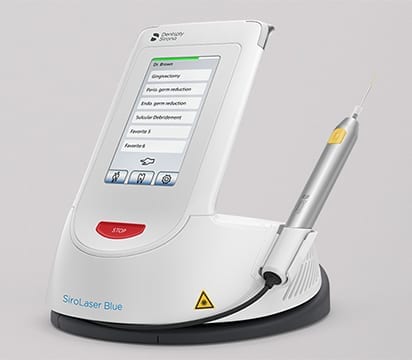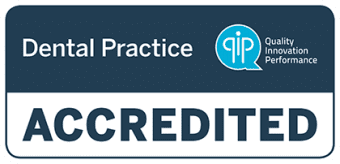“Gentle treatment and quick healing with the power of light” (Sirona)
Our qualified and experienced dentists use laser technology for a range of soft tissue procedures within oral surgery, as well as restorative dentistry and cosmetic dentistry.

The use of lasers for dental treatment is advanced, safe and highly effective. The laser is ideal for precisely removing or reshaping soft tissue and sealing the exposed blood vessels at the same time. Laser technology helps to reduce or eliminate bleeding, and provides a more sterilised treatment area. This can result in faster treatment times, and quicker patient recovery.

Our laser technology
At VC Dental we use a state-of-the-art soft tissue diode laser SiroLaser Blue. It is the first dental diode laser worldwide to deliver Triple-Wavelength Technology1 by combining the benefits of a blue, infrared and red wavelength2. This enables our laser to effectively be used for a range of dental treatments. The technology provides the best cutting efficiency of all dental diode lasers3, effective germ and bacteria reduction, and low level laser therapy (photobiomodulation).
How does a laser work?
LASER stands for “Light Amplification by the Stimulated Emission of Radiation”.
Laser technology is a sophisticated and versatile treatment that works by emitting a thin, concentrated beam of light energy. The light produces a reaction when it hits soft tissue, allowing it to be adjusted or removed.
The light can also sterilise treatment areas, cure bonding agents, activate bleaching agents and promote the healing of soft tissue.
What are the benefits of laser dentistry?
Dental lasers produce little to no sound, as well as little to no vibration which can provide a more comfortable experience for patients compared to traditional treatment methods. Lasers can also reduce or completely eliminate the need to use scalpels, needles or dental drills.
Laser instruments also provide the dentist with increased precision during treatment, and allow exact control over power output and exposure times.
Advantages of laser technology include:
- Reduced treatment time.
- Promotes faster healing/recovery.
- Reduces bleeding during and after surgery, and eliminates the need for sutures.
- Less damage to surrounding tissue which reduces or eliminates scarring.
- Bacteria are reduced at the surgical site as the light beam sterilises the area on-the-go, which minimises the risk of infection.
- Reduces post-operative swelling and discomfort
What can be treated with laser dentistry?
Our laser dentistry procedures include:
- Labial and lingual (tongue tie removal) frenectomies.
- Gum lifts (for example to enhance ‘gummy’ smiles).
- Treatment of gum disease.
- Exposure of unerupted teeth.
- Removal of gum pigmentation.
- Treating and promoting the healing of mouth ulcers.
- Performing biopsies.
- Sterilising root canals.
What is involved in the procedure?
Treatments may be performed entirely with the use of a laser, or a laser may be used in conjunction with other treatment methods.
Laser technology is quick, straightforward and is generally well tolerated under local anaesthetic (to numb the treatment area).
However, if preferred we do have sedation options available including inhalation sedation (‘happy gas’), oral sedatives and IV sedation to ensure you are comfortable for the duration of the procedure. You can read more about these options here.
References
- Dentsply Sirona: SiroLaser Blue Versatility in Laser Dentistry (https://assets.dentsplysirona.com/flagship/en/explore/instruments/lasers/Ins-Brochure-SiroLaser-Blue-EN-M45-C190-01-7600.pdf)
- Dentsply Sirona: Diode Lasers – Insights into a new world (https://www.dentsplysirona.com/en/explore/instruments/diode-lasers.html)
- Dentsply Sirona: SiroLaser Blue Versatility in Laser Dentistry (https://assets.dentsplysirona.com/flagship/en/explore/instruments/lasers/Ins-Brochure-SiroLaser-Blue-EN-M45-C190-01-7600.pdf)
Please note, any surgical or invasive procedure carries risks. Before proceeding you should obtain personal advice from an appropriately qualified health practitioner.


